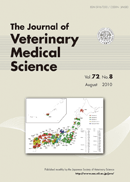Volume 72, Issue 8
August
Displaying 1-23 of 23 articles from this issue
- |<
- <
- 1
- >
- >|
Anatomy
-
Article type: FULL PAPER
2010Volume 72Issue 8 Pages 975-980
Published: 2010
Released on J-STAGE: September 02, 2010
Advance online publication: March 16, 2010Download PDF (661K) -
Article type: FULL PAPER
2010Volume 72Issue 8 Pages 1017-1022
Published: 2010
Released on J-STAGE: September 02, 2010
Advance online publication: March 25, 2010Download PDF (754K) -
Article type: FULL PAPER
2010Volume 72Issue 8 Pages 1041-1045
Published: 2010
Released on J-STAGE: September 02, 2010
Advance online publication: April 06, 2010Download PDF (810K) -
Article type: NOTE
2010Volume 72Issue 8 Pages 1047-1050
Published: 2010
Released on J-STAGE: September 02, 2010
Advance online publication: March 11, 2010Download PDF (649K)
Avian Pathology
-
Article type: FULL PAPER
2010Volume 72Issue 8 Pages 1027-1033
Published: 2010
Released on J-STAGE: September 02, 2010
Advance online publication: May 12, 2010Download PDF (792K)
Biochemistry
-
Article type: FULL PAPER
2010Volume 72Issue 8 Pages 991-997
Published: 2010
Released on J-STAGE: September 02, 2010
Advance online publication: March 16, 2010Download PDF (973K) -
Article type: NOTE
2010Volume 72Issue 8 Pages 1081-1084
Published: 2010
Released on J-STAGE: September 02, 2010
Advance online publication: March 19, 2010Download PDF (627K)
Clinical Pathology
-
Article type: NOTE
2010Volume 72Issue 8 Pages 1051-1056
Published: 2010
Released on J-STAGE: September 02, 2010
Advance online publication: March 12, 2010Download PDF (736K) -
Article type: NOTE
2010Volume 72Issue 8 Pages 1057-1061
Published: 2010
Released on J-STAGE: September 02, 2010
Advance online publication: March 12, 2010Download PDF (741K) -
Article type: NOTE
2010Volume 72Issue 8 Pages 1063-1066
Published: 2010
Released on J-STAGE: September 02, 2010
Advance online publication: March 16, 2010Download PDF (830K)
Laboratory Animal Science
-
Article type: FULL PAPER
2010Volume 72Issue 8 Pages 999-1009
Published: 2010
Released on J-STAGE: September 02, 2010
Advance online publication: March 25, 2010Download PDF (1175K)
Parasitology
-
Article type: FULL PAPER
2010Volume 72Issue 8 Pages 985-989
Published: 2010
Released on J-STAGE: September 02, 2010
Advance online publication: March 16, 2010Download PDF (687K)
Pathology
-
Article type: FULL PAPER
2010Volume 72Issue 8 Pages 1011-1016
Published: 2010
Released on J-STAGE: September 02, 2010
Advance online publication: March 25, 2010Download PDF (695K) -
Article type: NOTE
2010Volume 72Issue 8 Pages 1067-1069
Published: 2010
Released on J-STAGE: September 02, 2010
Advance online publication: March 16, 2010Download PDF (649K) -
Article type: NOTE
2010Volume 72Issue 8 Pages 1071-1073
Published: 2010
Released on J-STAGE: September 02, 2010
Advance online publication: March 16, 2010Download PDF (563K) -
Article type: NOTE
2010Volume 72Issue 8 Pages 1075-1079
Published: 2010
Released on J-STAGE: September 02, 2010
Advance online publication: March 19, 2010Download PDF (785K) -
Article type: NOTE
2010Volume 72Issue 8 Pages 1089-1092
Published: 2010
Released on J-STAGE: September 02, 2010
Advance online publication: May 12, 2010Download PDF (632K)
Pharmacology
-
Article type: FULL PAPER
2010Volume 72Issue 8 Pages 1023-1026
Published: 2010
Released on J-STAGE: September 02, 2010
Advance online publication: May 12, 2010Download PDF (623K) -
Article type: NOTE
2010Volume 72Issue 8 Pages 1085-1087
Published: 2010
Released on J-STAGE: September 02, 2010
Advance online publication: March 24, 2010Download PDF (534K)
Physiology
-
Article type: NOTE
2010Volume 72Issue 8 Pages 1093-1097
Published: 2010
Released on J-STAGE: September 02, 2010
Advance online publication: May 12, 2010Download PDF (557K)
Public Health
-
Article type: FULL PAPER
2010Volume 72Issue 8 Pages 969-973
Published: 2010
Released on J-STAGE: September 02, 2010
Advance online publication: March 16, 2010Download PDF (799K) -
Article type: FULL PAPER
2010Volume 72Issue 8 Pages 981-984
Published: 2010
Released on J-STAGE: September 02, 2010
Advance online publication: March 16, 2010Download PDF (646K)
Virology
-
Article type: FULL PAPER
2010Volume 72Issue 8 Pages 1035-1040
Published: 2010
Released on J-STAGE: September 02, 2010
Advance online publication: May 12, 2010Download PDF (806K)
- |<
- <
- 1
- >
- >|
